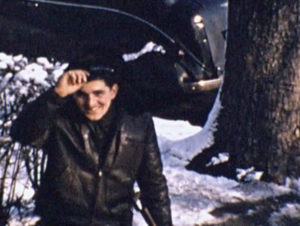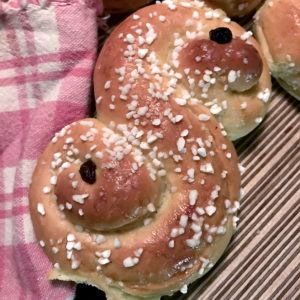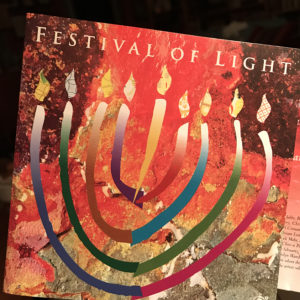This is for everyone who has experienced loss this past year, or ever, for that matter. I’m right there with you. I lost my dad in February. Nothing is ever the same once someone we love is gone. Things do get better eventually, but they are forever different. And this is just part of living, we know this. Knowing it, however, makes it no easier. Especially now, when we come to a juncture of the year that can be very difficult for anyone who is missing someone. And so this chapter of the Convivio Book of Days is for you, and for me, and for everyone who has felt this particular loss.
My dad is wrapped inextricably through my Christmas memories. He is part of the memories of Christmases I have from even before I was on this earth, for the stories come down through the ages. Dad was the one who, in recent years, spent hours trying to get light sets to work again once half the set had gone out, and he would re-wire some so that they had odd plugs spliced to them with electrical tape: green wires, brown plugs, black electrical tape… an “Angelo Cutrone Special.” They worked, but I’d cringe sometimes as I plugged them in, half expecting to get a shock or to have the plug explode once it made contact with the outlet. They never did. He usually knew what he was doing.
When I was little, it was Dad who decorated the house and front yard for Christmas. In the late 1960s, this involved a large electric candle, which, to the me that was 4-years old, seemed to tower twice my size, and it may very well have. It illuminated through and through and at the metal base, in script, it said Seasons Greetings and Dad would set it in place near where the driveway met the slate-covered walkway to the front door. There were illuminated choir boys, too, and multicolor lights––the kind with the big screw in ceramic bulbs, strung along the roofline attached to the stainless steel gutters that Dad would occasionally buff and polish. By 1970 or so, Dad quit the illuminated figures and the ceramic lights and from that point on it was a fresh balsam wreath wrapped in multicolor Italian fairy lights on the front door, another wrapped in red lights on the big front window of my sister’s room, and a strand or two of white lights thrown into the canopy of the crab apple tree. He’d just toss them up there. Where they landed, they landed.
Before I was born, though, there was a record player connected to outdoor speakers and Dad would play Christmas music for the neighbors, whether they wanted to hear it or not. He rotated through four or five records that we still have and still play each Christmas: Johnny Mathis’ Christmas album, an album featuring a child’s choir from England backed up by a Big Band era sounding orchestra, Christmas carols on piano by Roger Williams, and an album of all your Christmas favorites played entirely by an orchestra of bells. The Hartmans, an older couple up the road, did not care for the music, but they were friendly about it all the same. Dad would always complain that he should’ve put the lights up the week before it had gotten so cold. But he never did; he’d always be out there on the coldest day of December. Christmas was not to be rushed, after all. Sometimes there was snow. Once he pulled me up the sidewalk while I sat on my sled. I think it’s the only time I used it. For the rest of my childhood, the sled hung on the wall in the garage. We were not an outdoor people, my family.
I think of all these things––even of the Hartmans, who had moved to Vero Beach before I was born––and I think of my dad as I do my own decorating outside in the balmy Lake Worth night, just as I think of Dad every single time I go to my family’s home to mow the lawn since his passing. I sit on the rider mower as he used to and I think of Dad, as I mow with care, trying to keep straight lines like he would, and I think of him as I sweep the sidewalk, sweeping up the grass clippings just as he taught me: Corn broom along the edge, push broom down the middle.
This simple task of mowing the lawn can make me a bit emotional sometimes, and Christmas just heightens this. Earlier this month Seth and I received the new Christmas Revels recording for 2017, Tutta Bella: A Venetian Christmas Revels. For years I’ve watched the Revels create Christmas programs set in England, Ireland, Scotland, Wales, France, and Spain, and wished that someday there would be a Revels set in Italy. This year I got my wish. But when the CD arrived, I read the list of songs and was disappointed to find my favorite Italian Christmas carol, “Tu Scende Dalle Stelle,” was not part of the program. The disc arrived in early December, too soon in our book to listen to Christmas music (we’re just beginning to listen to Advent music at that point). But on Sunday morning, just yesterday, I finally added the new CD to the player. The first couple of songs played and they were good, a bit of horn fanfare… and then the third song began with a familiar haunting melody. It was my song, given a different name, “Quanno Nascette Ninno.” My heart leapt and then tears welled up in my eyes. I thought of my grandmother, who did not sing but who did sing that song. The pipers would come down from the mountains, she told me, each Christmas Eve, into her village in Italy. They would play this song. I thought of Grandma, and Grandpa, and Dad, too, and I couldn’t figure out what I was feeling. Certainly some combination of sadness and joy. And this, too, is life.
Mom has agreed to a Christmas tree this year and so we put up the tree at the family homestead a week ago. But she wants no decorations outside and a very pared down celebration of Christmas in general, out of respect for Dad’s passing. Christmas, especially, brings up so many emotions for those of us who have experienced loss, and it feels a bit inauthentic, perhaps, to celebrate. But it is right as well to celebrate and continue what those who have passed taught us, if for no other reason than to keep them present in our days. There is, of course, no right or wrong way to approach these things. What I know is I am so happy that Mom chose to keep a tree this year. That tree will be even more central and more important than ever when we gather round it, and so will the creche, the nativity scene, reminding us of the child (and the child we all once were) and the story we’ve heard a thousand times, the story that never grows old. We’ll hear it again, and again: the child come down from the stars… and in that light, we gather up our memories and we take joy, take peace, take heaven. And so if you, too, are in this same strange place this Christmastime: it’s ok. We are right where we need to be, you and me both. And we’ll all be there for each other.
Film: Dad shoveling snow in Brooklyn, New York, 1952 or 1953.


